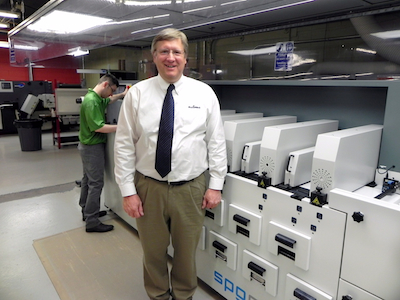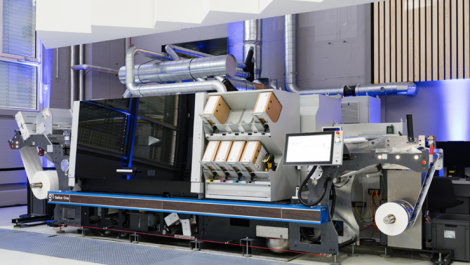Keith Rosenthal, vice-president of manufacturing at McLoone
Wisconsin-based McLoone has boosted productivity, accelerated throughput, and increased profitability by migrating flexible label production from screen to digital with the SPGPrints DSI UV inkjet press.
Since installing the press, the whole way the company operates its flexible label production has been transformed. The industrial labels produced by the company are short run products, printed in batches in runs from approximately 100 linear meters to a maximum of about 3650. Previously, this work was carried out on the company’s 12 flatbed screen presses.
The press is a five-colour machine, featuring opaque white along with standard CMYK, has a width of 333 mm and can handle the substrate ranges from 51 micron to 254 micron in thickness. The company was also attracted by the press’s ability to print on a wide range of substrates with its specially formulated inks.
The single-step digital printing operation replaces as many as 20 labour-intensive screen production steps, which included custom-made ink formulations for every colour, stock cutting, screen imaging for every colour, and printing each colour on separate machines. The company also invested in an off-line digital laser cutter to accelerate finishing by eliminating the need for dies.
Keith Rosenthal, vice-president of manufacturing, commented, ‘We were experiencing heavy pricing pressure, and required to fulfil several dozen orders each day. We recognized that, by relying exclusively on flatbed screen, we were unable to achieve our growth potential due to the lengthy setup times and complicated workflows. We needed to re-engineer the industrial label manufacturing process.’
While a digital process results in a simpler, cost-efficient workflow, those who adopt it have to learn about prepress. McLoone’s digital manager and SPGPrints trained staff in file handling, detailing cut sizes, and other aspects of digital workflow and colour specification.
McLoone’s customers require durable label construction and variable data, and a UV-curable digital solution was essential. ‘Industrial labels must perform for several years, perhaps resisting abrasion in the logistics chain, extreme weather and sunlight, water and corrosive chemicals,’ explained Mr Rosenthal. We subject samples to accelerated weathering (‘QUV’) tests for outdoor durability, and a range of chemicals, including household and industrial chemicals and detergents. The ability of SPGPrints’ inks to withstand these conditions was a principal reason for investing in the DSI press.’






